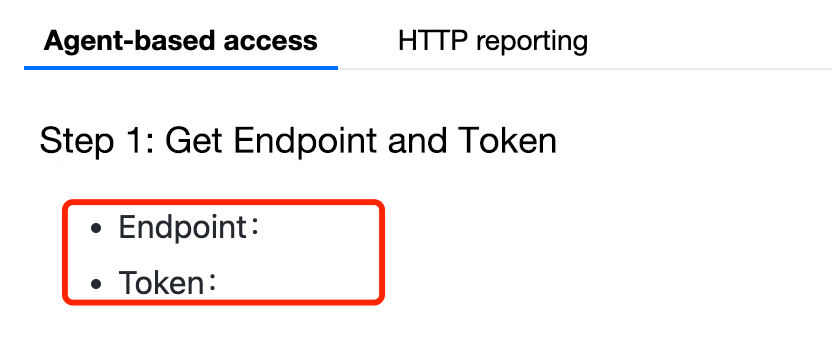- Product Introduction
- Purchase Guide
- Getting Started
- Operation Guide
- Best Practices
- Access Guide
- Parameter Information
- FAQs
- Glossary
- APM Policy
- Product Introduction
- Purchase Guide
- Getting Started
- Operation Guide
- Best Practices
- Access Guide
- Parameter Information
- FAQs
- Glossary
- APM Policy
Reporting with OpenTelemetry - gRPC Go Interceptor
Last updated: 2023-12-25 16:01:25
This document describes how to report the data of a Go application with Jaeger HTTP.
Directions
Step 1. Get the endpoint and token
Enter the Application monitoring > Application list page, click Access application, and select the Go language and the Jaeger HTTP data collection method.
Then, get the endpoint and token in the step of access method selection.


Step 2. Modify the endpoint information
Note:
We use the gRPC Go interceptor to report data, and the endpoint needs to be changed to ap-guangzhou.apm.tencentcs.com:14268/api/traces. Data can be directly reported to the collector, with no agent required.
Step 3. Import dependencies
You should import the SDK instrumentation dependencies of OpenTelemetry.
Step 4. Initialize the trace
// Configure OpenTelemetry under `Init`func Init() *sdktrace.TracerProvider {if ctx == nil {ctx = context.Background()}// Create an exporter and set the basic endpointopts := []otlptracegrpc.Option{otlptracegrpc.WithEndpoint("<endpoint>"),otlptracegrpc.WithInsecure(),}exporter, err := otlptracegrpc.New(ctx, opts...)if err != nil {log.Fatal(err)}// Set the token or configure the environment variable `OTEL_RESOURCE_ATTRIBUTES=token=xxxxxxxxx`r, err := resource.New(ctx, []resource.Option{// Set the token valueresource.WithAttributes(attribute.KeyValue{Key: "token", Value: attribute.StringValue("<Token>"),}),// Set the service nameresource.WithAttributes(attribute.KeyValue{Key: "service.name", Value: attribute.StringValue("audotanggrpcdemo"),}),}...)if err != nil {log.Fatal(err)}// Create a TracerProvidertp := sdktrace.NewTracerProvider(sdktrace.WithSampler(sdktrace.AlwaysSample()),sdktrace.WithBatcher(exporter),sdktrace.WithResource(r),)otel.SetTracerProvider(tp)otel.SetTextMapPropagator(propagation.NewCompositeTextMapPropagator(propagation.TraceContext{}, propagation.Baggage{}))return tp}
Step 5. Select the reporting type to report application data
Server
1. Initialize TracerProvider.
// Initialize the tracetp := trace.Init()defer func() {if err := tp.Shutdown(context.Background()); err != nil {log.Printf("Error shutting down tracer provider: %v", err)}}()// Specify the hosthost := os.Getenv("grpc1")lis, err := net.Listen("tcp", host+":7778")if err != nil {log.Fatalf("failed to listen: %v", err)}
2. Configure the interceptor.
s := grpc.NewServer(grpc.UnaryInterceptor(otelgrpc.UnaryServerInterceptor()),grpc.StreamInterceptor(otelgrpc.StreamServerInterceptor()),)
3. Start the server service.
// Register our service with the gRPC serverapi.RegisterHelloServiceServer(s, &server{})reflection.Register(s)if err := s.Serve(lis); err != nil {log.Fatalf("failed to serve: %v", err)}
Client configuration
1. Initialize TracerProvider.
// Initialize the tracetp := trace.Init()defer func() {if err := tp.Shutdown(context.Background()); err != nil {log.Printf("Error shutting down tracer provider: %v", err)}}()
2. Establish a connection to configure the interceptor.
// Establish a connection to the server to configure the interceptorconn, err := grpc.DialContext(context.Background(), "localhost:7778", grpc.WithTransportCredentials(insecure.NewCredentials()), grpc.WithBlock())
3. Make a gRPC call.
c := api.NewHelloServiceClient(conn)for {callSayHelloClientStream(c)time.Sleep(100 * time.Millisecond)}

 Yes
Yes
 No
No
Was this page helpful?